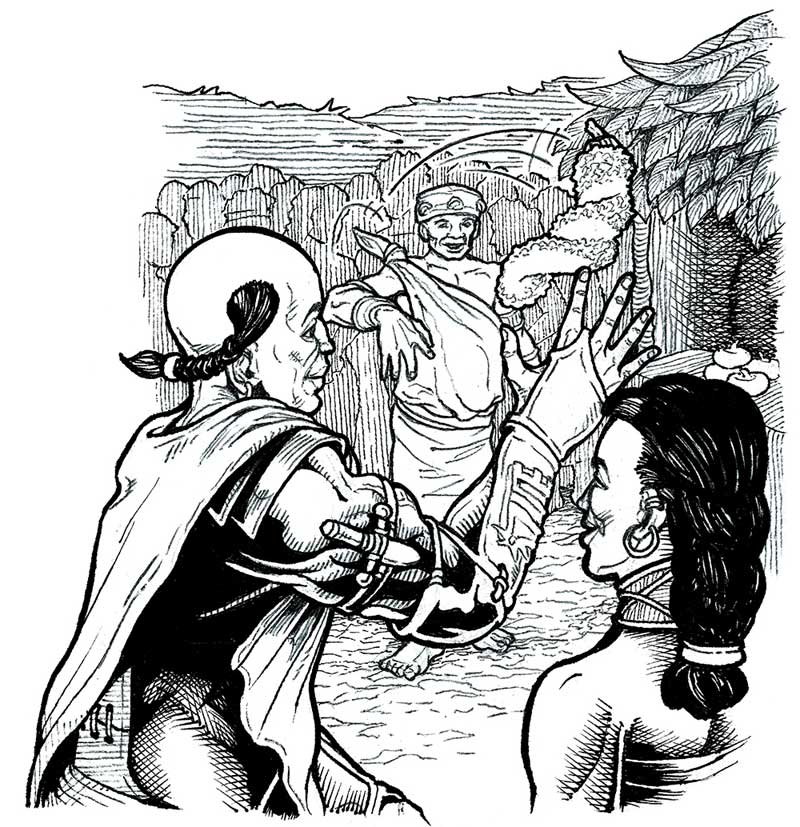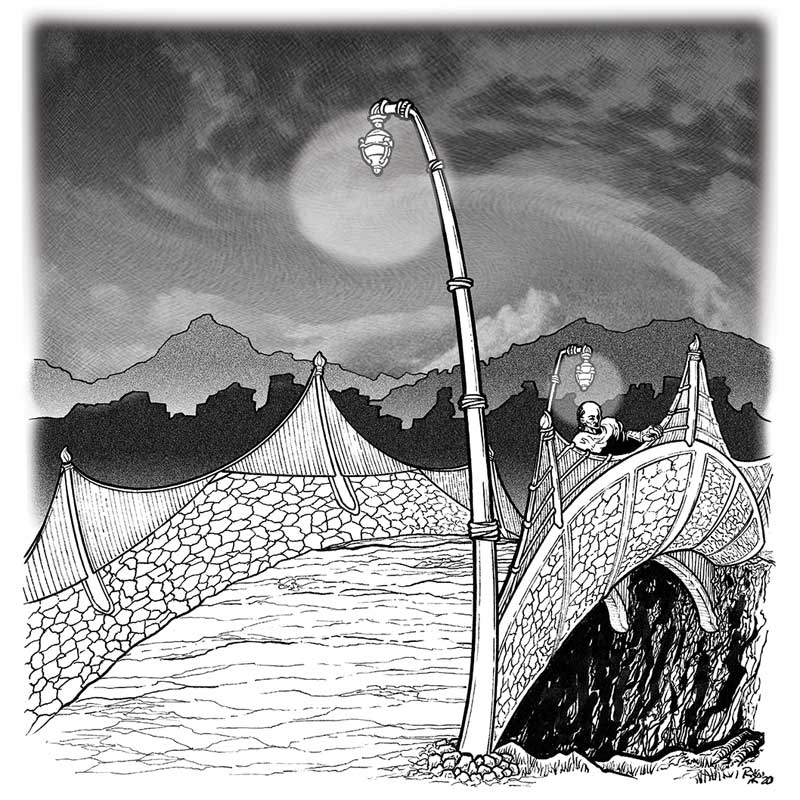Ithuriel: Inception (Chapter Three)
Presenting original fantasy fiction from Robert Roach, this prose series features sword and soul hero Ithuriel in adventures placed in fantasy lands.
Read the first installment | read the previous installment | Read the next installment | Read the latest installment
PART THREE
Kuanzishwa 701, the Ninth Month, 17th day – the First Month, 12th day
(Kuanzishwa is the Swahili word for "establishment" or "inception." It's the calendar designation for this era.)
Ithuriel continues to meander the capitol's streets, lost in thought. This blustery night matches the massive young man's reflections.
Despite being the only son of -- arguably -- Aston's most significant man, Ithuriel's not considering his life's "macro" deliberations at the moment. Right now, the "micro" & immediate concerns -- who he will become & how this to-be-defined person will fit into society -- are on his mind. How he will best benefit Kahnuri & stay true to himself. Due to his upcoming Rite of Passage, these are the things the young warrior has to figure out.

But at least he's here, in Aston. Ithuriel appreciates that he's in this beautiful city & able to enjoy its breathtaking backdrop. If one has to decide who they'll be for the rest of their life, Ithuriel believes that this city is the best place for such calculations.
Nature & structure amply intermingle in Aston, Kahnuri's capital. The city's abundant amount of trees -- eucalyptus, musizi, mango & other foliage -- integrate with the city's buildings. From the humblest Aston resident up to the royal palace, they're all able to enjoy nature as a commonplace part of their daily lives. This, along with Aston's prototypical infrastructure & physical layout, make the metropolis arguably the continent's most beautiful.
Ithuriel is proud that this is his hometown. No place feels more natural to him. As son of Aston's most prominent statesman & one of the realm's most lauded ex-generals, Ithuriel has seen all of his country & most of The Nigritia's other countries. He's met many of his father's foreign friends & colleagues. Being Tzumé's son has provided uncountable benefits.
However, being this great man's son has also brought heavy responsibilities.
The time has come to weigh these benefits & responsibilities as he charts the rest of his life.
People walk the streets, ride their beasts & are being carried in their palanquins. It makes Ithuriel happy to see the city functioning as it always has -- except that traffic seems a bit lighter than usual.
He randomly wanders Aston's active roads, deep in thought. Beyond his own reverie, Ithuriel senses something more. Something deeper. Something more sinister. But it's something Ithuriel has yet to identify & define, so he pushes these considerations down -- suppressing them for a later date.
Aston is a metropolis in which architecture, city planning & nature all complement each other. Muted reds, a wide range of greens & blues, purple & golden frieze -- along with the area's verdure -- decorate the city's buildings. Whether rich or poor, all the residents take pride in their individual homes & in the city as a whole. Aston's flora blends nicely with the earthen clay from which many of its buildings or the buildings' bricks are made.
Limestone & marble, along with some clay, have also been traditionally used to construct more upscale homes & palaces -- as well as the city's municipal structures. This is particularly true with the municipality's elites & its royal family's mansions -- especially the regal citadel.
King Telamahn's estate is a radiant & extraordinary example of gorgeous architecture & Aston's blend of structure & nature. Built in the region's higher elevations & out of one of the city's higher of its rolling hills, the castle had been erected centuries earlier. The palace is partially carved out of the hillside's limestone & partially constructed above ground. Like majestic Lalibela -- scores & scores of millennia later, chamber-after-chamber have been hewn from the hill, leaving only the royal mansion & the stream that originally flowed over the mound.
The creek's route has been slightly altered so that it now runs through the palace's fourth floor, ending in a 40-feet waterfall. The cascade flows into a large & ornate fountain, which is the imperial garden's centerpiece. The stream is allowed to flow through the parkland, beyond the castle's imposing walls & back into Aston -- eventually spilling into the nearby lake. Above the castle, irrigation structures regulate the rivulet's flow. This ensures that all the city's residents will have access to clean water & when there's an unforeseen monsoon or the like, water can be diverted so that the palace's fourth floor doesn't flood.
Impressive marble columns, arches, walls & tiled floors help to perfect the mansion's interior grandeur. Gold is the most prominent precious metal used in the architecture, which, in design, is a foreshadowing of Mali's Timbuktu (Tombouctou), Nabatean & Bamum construction styles all mixed together.
While impressive & reflecting Kahnuri people's mastery of manufacturing, Aston's buildings & neighborhoods have always & continue to reflect their close, loving relationship to their country & natural surroundings. This has been true for centuries. It remains true today.
Ithuriel meanders through the winding streets. As dusk transitions to twilight, the young man reacts to various aromas in the air. Ithuriel smiles & detours toward Aston's Central Marketplace, following the scents.
From above, the bazaar's conglomeration of stalls -- large & small -- creates a rough trapezoid. The marketplace is about half a mile wide/just under a mile long & it runs next to Aston's Chii'chaan River.
Most stalls are about the same size, 8-feet by 10-feet, though they vary by configuration & the products being sold. None of the trails snaking through are straight. But there's still some strange semblance of order within the open market's haphazard layout.
All of the stalls are made from the nearby forest's materials -- posts, for the foundational structures, fronds from banana-like trees' leaves as the roofing & such. These leaf-made roofs vigorously flap in the blustery evening. But the entire marketplace has been constructed to work with nature, not as an attempt to conquer nature. So the structures' swaying & groaning is by design. Outside of a major tempest hitting Aston, it's likely that the stalls will easily weather any storm.
The shops' owners design each of their locations to reflect their individual personalities.
Beans, plantains, rice -- all kinds of foodstuffs -- are readily available at Central Marketplace. Most produce being sold here are also grown & cultivated by the merchants & their families living in Aston's northern & western villages. The meat being sold at the market falls into two categories: smaller animals -- mainly chicken-like foul, other poultry & goat-like animals -- are raised & butchered or milked by farmers on Aston's outskirts, also to the northwest; other larger game is killed, dressed & sold at the bazaar by the hunters. This game's availability changes from day-to-day. Fish from the nearby lake are also sold on a daily basis.
Numerous vendors know Ithuriel. In addition to being Tzumé's son, Ithuriel is popular on his own. One of them tosses Ithuriel a large, pear-like piece of fruit. Most of them are shuttering their stalls, in anticipation of the storm. The marketplace is only two-thirds its usual activity. But it's still busy enough. Ithuriel worms his way through the bazaar's many people, threading between crowds & continually ducking his head so that the young warrior doesn't brain himself on the low eaves.
Here & there, trios of foreign visitors drift through the open market. Though they buy nothing, they seem engrossed in the marketplace's activity. And they seem to stick to the area's shadows.
As he finishes off his fruit, Ithuriel exits the bazaar. He's back on the well-trod city streets. The even, well-worn surfaces have been tramped flat by centuries of sandals, bare feet, wheels & beasts of burden. The thoroughfares' composition -- a mixture of sand, clay, sun & time -- is pretty much waterproof. Though twisting occasionally, due to the placement of certain buildings & natural topographic details, the streets' layout is by-&-large regular.
Night watchmen meticulously walk the streets, lighting the municipal lamps. The flames are protected by the lamps' containers, which swing with the rising wind. The flames' wicks burn on hardened, congealed fat from the mammoths populating the nearby jungles. This night is steadily becoming windier & blustery. It's definite that a storm is heading toward the capital.
Like other Aston citizens, the watchmen greet Ithuriel warmly. He smiles & waves back. Again, given Ithuriel's physique & his father's notoriety, this is commonplace. Despite his smiles & these distractions, Ithuriel's thoughts remain deep.
Military. Politics. Business. Education. Options abound for Ithuriel. He's imminently qualified to pursue any -- if not all -- of these possibilities. And more.
Another option that he's long ignored is the trail that was blazed by his long-missing mother: necromancy.
Though -- deep in his heart -- this course of action doesn't truly appeal to Ithuriel, it must be considered. It especially must be contemplated since he's been experiencing his recent psychic turmoil.

Ithuriel pauses on Molímo(3) Bridge as he ruminates. Something is amiss. He can deeply FEEL this. But he can't figure out why.
"Greetings, Master Ithuriel," he hears.
3: The Lingala word for "soul."
Ithuriel story elements are the sole property of Robert Roach/Hometown Productions ©2020
Read the first installment | read the previous installment | Read the next installment Read the latest installment
Words and illustrations by Robert Roach




